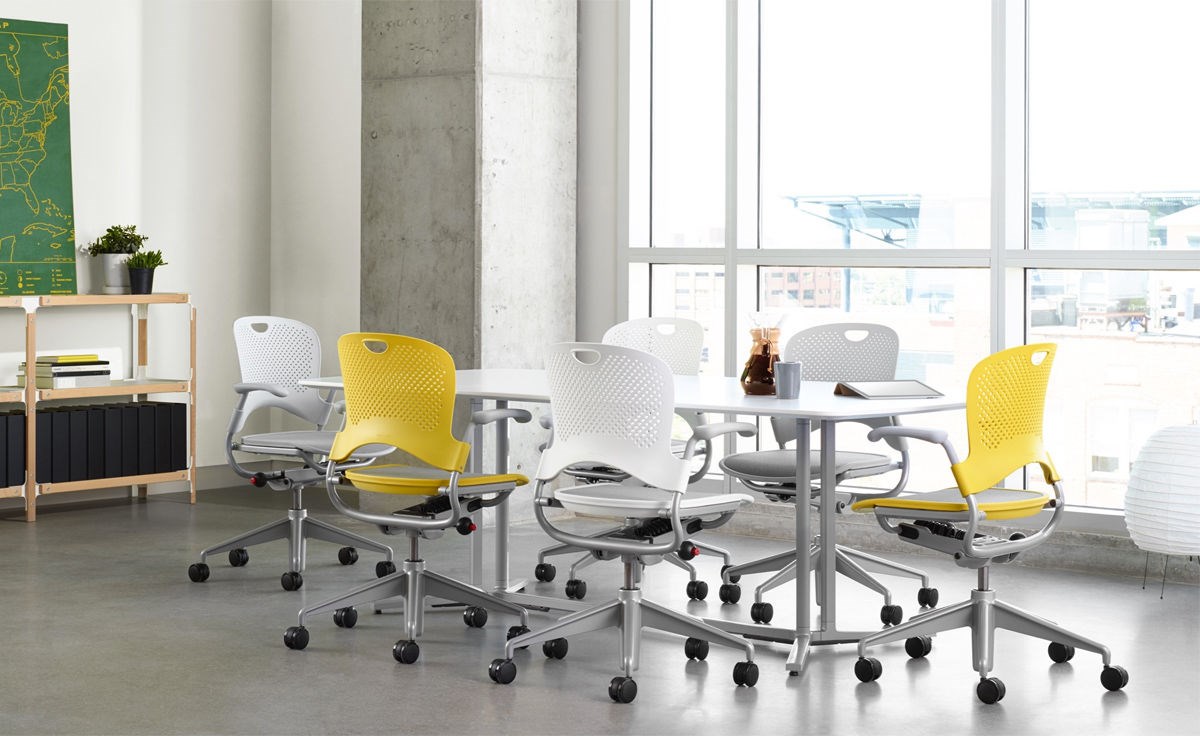Caper Multipurpose Chair
- Designer:
- Jeff Weber
- Brand:
- Herman Miller
We don't appear to have any products related to your search term. Please try again.
Shipping and discount codes are added at checkout.

“There should always be a human benefit associated with whatever it is we’re designing.”
As a child, Jeff Weber was fascinated by the way things worked. “I was always tinkering, either building things or tearing them apart,” he says. Watching his mechanical talents develop, his grandfather suggested that he consider becoming an industrial designer. Once he learned more, “I never really thought about doing anything else,” recalls Weber.
Today he uses his considerable talents to improve the human condition by designing products that enhance people’s lives, both at home and at work. “There should always be a human benefit associated with whatever it is we’re designing,” he explains. “It’s all about the experience, stimulating a person’s senses in a positive or beneficial way.”
While Weber’s work includes a wide spectrum of products, he became interested in furniture design when he teamed up with Bill Stumpf, who worked with Herman Miller for 30 years. “Bill’s design spirit will inspire all my future work,” says Weber. One example is Stumpf’s “uni-part” theory. “It says that all components of any given object must have a functional purpose as well as an aesthetic one,” says Weber. “It’s a fundamental principle we employ every day.”
Early on, Weber had the good fortune to work with Stumpf and his team on the Aeron Chair for Herman Miller (1989). Looking back, Weber says, “The Aeron chair is one of the rare objects that represent the convergence of the right problem, the right vision, at the right time, involving the right people and organization.” Together they formed Stumpf, Weber & Associates in 1999, going on to design the Caper Stacking Chair (1999) and the Embody Task Chair (2008), also for Herman Miller. Following Stumpf’s death, Weber founded Studio Weber & Associates, his Minneapolis-based design firm, in 2009. Studio Weber continues his focus on workspace solutions. “We are involved in multiple seating projects for the office, higher education, healthcare, laboratory and residential applications, as well as a series of digital living products and hydroponic gardening systems. We are interested in advancing the arts of daily living, touching every aspect of people’s lives.”

Weber is a proponent of what he calls “empathic design,” a belief in the designer’s responsibility to research, empathize with and advocate for all involved in a product’s life cycle, from manufacturer to distributor to end user, before starting work. “Empathy makes good business and allows designers to identify human problems that lead to solutions that can culminate in legitimate commercial and altruistic ventures.” The resulting design’s most essential qualities will be so intuitive they go almost unnoticed.
Empathic design has had real-world applications for Weber. Following a foot injury in 2006, he discovered first-hand how disagreeable walking with standard crutches could be. “I quickly identified that the standard-issue mobility aid caused secondary trauma. So I began to determine how to humanize a crutch architecture that would eliminate the secondary trauma and enable people to convalesce from injury while continuing to participate in life’s activities with dignity.” The result was Mobilegs: ergonomic, user-friendly, technologically advanced crutches.
Weber was awarded the Best of NeoCon Gold for the Caper Chair in 1999 and the Best of NeoCon Silver in Ergonomic Desk and Task Seating for the Embody Chair in 2009.
Inspired by the human body, Weber sees a challenge in the fact that while the workplace has undergone many changes over the years, the human element has stayed very much the same. “How can I produce something that will actually improve that condition?” he asks. His solutions employ design as a blend of art and science.